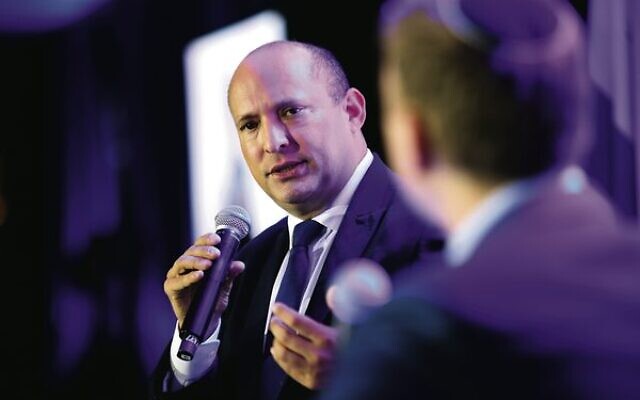‘We need to calm things down’
Bennett described tensions over proposed new religious laws and changes to the judicial system as the most profound social crisis in Israel's history.

ADDRESSING more than 800 guests at the United Israel Appeal (UIA) Melbourne gala event on Tuesday, Naftali Bennett, in a podium interview with Jeremy Leibler, was asked by the Zionist Federation of Australia president if he thought Iran is Israel’s greatest threat.
The former Israeli PM might have surprised some in the audience with his response: “The greatest threat is domestic division – more than Iran.”
Bennett has described tensions over proposed new religious laws and changes to the judicial system as the most profound social crisis in Israel’s history and “a 100 per cent self-inflicted mess”.
The 2021-22 PM, who also addressed UIA events in Sydney and Perth, spoke to Leibler about “a battle between two groups, and unfortunately some people are working hard to create the division between those two groups, those two ‘tribes'”.
“I hate the terminology but I’ll use it – there’s ‘first Israel’, let’s call it Ashkenazi, secular … in the Tel Aviv area … and ‘second Israel’, which are typically Likud, Shas, Charedim, in many cases lower incomes.
“Somebody has been pitting these two groups against each other and there’s a lot of resentment and anger, and primarily anxiety and fear. People are afraid on both sides.”
He described the arguments over changes to the judicial system as “a manifestation” of these divisions. Although the judicial system “has flaws” – and the high court has been overused as “a higher second opinion” against Knesset lawmakers – Israel’s Supreme Court should be able to continue ruling against laws that contravene the Basic Law, he said.
About planned new religious legislation, he stated, “Judaism is not about coercion … What we really need to do is just calm things down.”
Taking a historic view, Bennett said Israel’s first and second commonwealths had respectively not survived 70 and 80 years, torn apart by internal rifts, and “the Jewish people have never crossed the 10th decade as a Jewish sovereign and united state. This time we darn well will”.
Iran’s threat comprises a nuclear and a terrorist aspect, he said. As to the nuclear threat, “We are on it,” he assured. As to terrorism, Iran runs a proxy network of arming Hezbollah, and other groups in Syria and Gaza. “Those proxies bring havoc and terror, those arms envelop Israel like an octopus … [The Tehran regime] sit one thousand miles away and we shed blood on our borders.” But Israel has adopted what he termed “the octopus doctrine – don’t fight the arms … go for the head”.
When, for example, a drone base in Iran was destroyed and a terrorist commander in Tehran was eliminated, it sent a powerful message to the Iranian regime, he said.
After war broke out in Ukraine 12 months ago, Israel was caught “between a rock and a hard place”, said Bennett. His government wanted to assist Ukraine but feared retaliation from Moscow against Jewish communities in Ukraine and Russia, and Russian ground-to-air missiles being deployed against Israeli fighter jets keeping the Syrian war from Israel’s border.
But he reminded his audience that Israel was the first country to set up a field hospital in war-torn Ukraine. As a mediator between Vladimir Putin and Ukrainian President Volodymyr Zelensky, Bennett secured a commitment from the Russian President not to have his Ukrainian counterpart killed. Israel has interceded with the Kremlin to spare the lives of mayors in key Ukrainian cities.
Bennett said his coalition government uniquely straddled “right and left, religious and secular, Jews and Arabs”. Although he “harboured hesitancy”, he brought MK Mansour Abbas of the Islamist Ra’am party into the government and met with him in the Knesset.
The ex-PM described his government as “one of the most effective in Israel’s history”, battling street violence between Israeli Jews and Arabs and the COVID crisis. The deficit was reduced and calm was restored on Israel’s southern border. “A unity government is now the only way forward,” he said.
UIA Victoria shaliach Daniel Tuksar related his journey from war-ravaged Yugoslavia to the US and to Israel in the 1990s.
New UIA Victoria president Peter Horovitz declared, “In a world where it’s come to mean something negative, I am a staunch Zionist.” He described Israeli democracy as “sometimes flawed but always robust”.
In Israel’s 75th year, Horovitz called on supporters to dig deeper than ever before – and to underscore his rallying call, former Ukrainian Jew Diana Bukhman, a guest of the UIA event, detailed her harrowing escape when war broke out in her homeland a year ago.
For Bukhman, 5am on February 24, 2022 is etched in her psyche as the hour the war began. Her mother urged her to make aliyah for the sake of her two young children. After a frightening journey to the Romanian border, during which Bukhman lay over her children to protect them during a bombing raid, they arrived at the Jewish Agency in Bucharest, before flying to Israel on March 9.
At Ben-Gurion airport, their group was greeted by UIA personnel with gifts and sweets for the children and taken to a Jerusalem hotel. She says she misses her parents deeply, but she and her children now have an apartment, the kids go to school and she attends a Hebrew ulpan.
Thanking UIA, Bukhman urged her audience, “Consider for one second, what would happen if it was you or your family who needed that help.”

comments